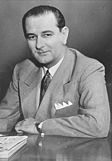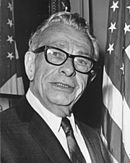U.S. Senate election, 1958
|
|
||||||||||||||||||||||||||||||||||||||||
|---|---|---|---|---|---|---|---|---|---|---|---|---|---|---|---|---|---|---|---|---|---|---|---|---|---|---|---|---|---|---|---|---|---|---|---|---|---|---|---|---|
|
||||||||||||||||||||||||||||||||||||||||
|
32 of the 98 seats in the United States Senate (with special elections) 49 seats needed for a majority |
||||||||||||||||||||||||||||||||||||||||
|
||||||||||||||||||||||||||||||||||||||||

Democratic gain Democratic hold Republican hold
|
||||||||||||||||||||||||||||||||||||||||
|
||||||||||||||||||||||||||||||||||||||||
The United States Senate elections of 1958 (and subsequent special elections in 1959) were elections for the United States Senate which occurred in the middle of President Dwight D. Eisenhower's second term. As is common in midterm elections, the party in the White House lost seats, but losses this year were on a huge scale, perhaps due to the high unemployment of the Recession of 1958. The Eisenhower Administration's position on right-to-work issues galvanized labor unions which supported Democrats. The launch of Sputnik may also have been a factor. The Democratic Party took thirteen Republican seats (10 of them by defeating incumbents), and also won both Senate seats in the new state of Alaska. Senate elections in 1959 in the new state of Hawaii were split between the two parties; combined with the 1958 results, this yielded an aggregate gain of 16 seats for the Democrats for a party balance of 65-35. This is the largest swing in the history of the Senate, and is only the second time in U.S. history that 10 or more Senate seats changed hands in a midterm election (after 1946).
No Democrats retired.
No Democrats lost re-election.
West Virginia's delegation changed from two Republicans to two Democrats.
For the November 5 and November 25, 1958 general and special elections.
Colored shading indicates party with largest share of that row.
In these special elections, the winner was seated during 1958 or before January 3, 1959; ordered by election date.
...
Wikipedia


